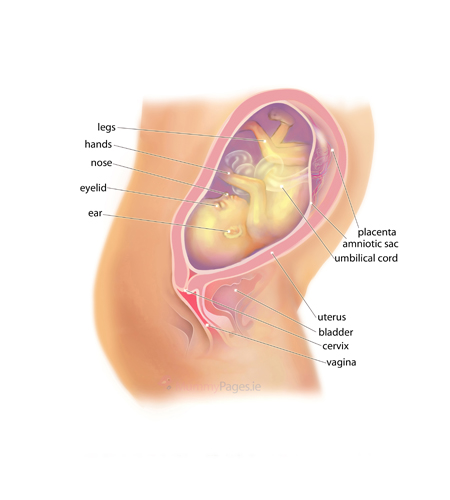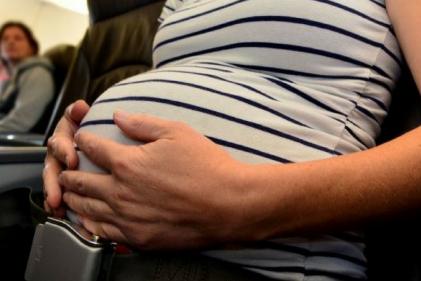Well, it is now week 27 and the time is going by fast. Your baby’s milestone for this week is her changing position. She is now beginning to reposition herself in preparation for birth. As for you, week 27 can add some new symptoms. Some familiar symptoms could also reoccur.
Your Baby this Week
Your baby is now around the size of an aubergine
Week 27 and your baby’s now weight is now close to 900 grammes (2 pounds). Her length is about 37cm (14½ inches) if her legs were straightened out . Your baby has a set schedule now, sleeping and waking up at regular intervals. She opens and closes here eyes, sucks her thumb, clasps her hand together, and even makes facial expressions. If you were to have an ultrasound at this time of your pregnancy, you would see incredible detail. This is especially true for the 3D or 4D ultrasounds. They are so detailed, they almost look like photographs.
Your baby’s brain is extremely active now and is continuing to develop some of the more detailed areas, such as memory centres and the areas that control cognitive thinking. Her lungs are developing more every day although at this stage, they are still quite immature. You probably notice some very rhythmic movement occasionally. It’s probably your baby having the hiccups. They are not bothered by these hiccups though. So don’t worry about that.
Your baby is certainly more crowded in the womb now. She still manages to move quite a lot though - you feel her kicks and punches more now. And, if you look at your tummy when you feel these movements, you will more than likely notice that your stomach rising and falling as your precious little one turns and squirms.
At 27 weeks, your baby is also beginning to slowly position herself for her journey down the pelvis. She may even be positioned head down already.
Your Body this Week
It’s now 27th week and you are headed for the finish line! There could be some new symptoms coming your way in the next several weeks. If you have not yet had backaches and leg cramps, you may now. As your weight increases, your back muscles and your leg muscles take a beating. Make sure to get plenty of rest and don’t overdo it now!
It’s important for you to know the symptoms of early labour and the signs of things that can go wrong at this stage in your pregnancy. If you notice any of the following symptoms, make sure to contact your doctor.
- Pressure in your pelvic area like the baby is pushing down
- Persistent menstrual-like cramps or abdominal pain
- More than four contractions in less than one hour
- A vaginal discharge that is watery, bloody, discoloured, or mucus-like in texture
- You feel less movement of your baby
- Tenderness of the abdomen
- Painful urination
- Decreased urination
- Vomiting accompanied with pain or fever
- Fever over 37.5 degrees C with chills.
- Altered vision; blurred, doubled, or seeing spots
- Severe headache with blurred vision
- Swelling of the face
- Swelling of the hands, legs, feet, and ankles that is sudden and severe
- Pain in the leg that is persistent and severe
- Fainting, dizziness, or heart palpitations
- Trouble breathing
- Severe diarrhoea or constipation
- All over itching
- Any existing condition that worsens
This is also a good time to start thinking about breastfeeding or bottle feeding. Breastfeeding is beneficial in so many ways. It is known that breastfeeding can reduce the risks of ear and respiratory infections, type 2 diabetes, Sudden Infant Death Syndrome (SIDS), and certain stomach and intestinal infections. Babies who are breastfed are less likely to be obese as an adult, and are less likely to contract colds and flu. If you plan on breastfeeding, now is the time to get informed.
Pregnancy Tip
Many women find that they have excessive gas during their pregnancy. The reason is that the increased level of progesterone causes the muscles of the intestines to relax and slows down digestions. As food takes longer to digest, more gas is created which leads to bloating, burping, and flatulence.
Relieve excessive gas by cutting back on the foods that cause gas like beans, cauliflower, Brussels sprouts, asparagus, and cabbage. Certain starchy foods can also cause gas, and if you are lactose intolerant, dairy products should be avoided.









